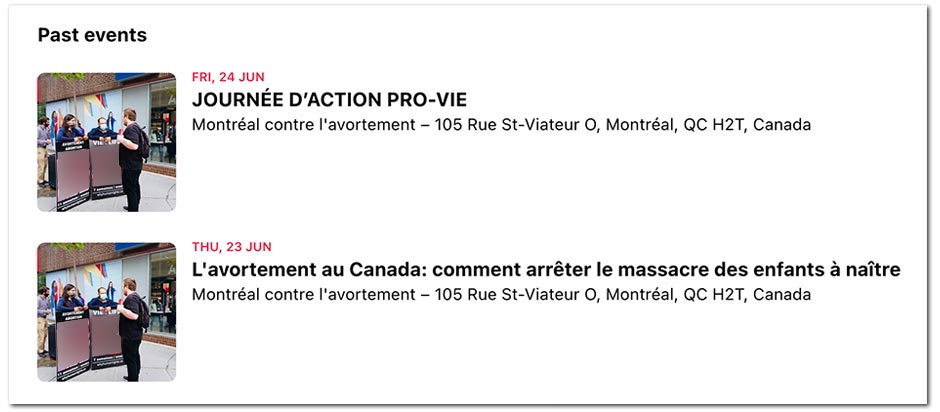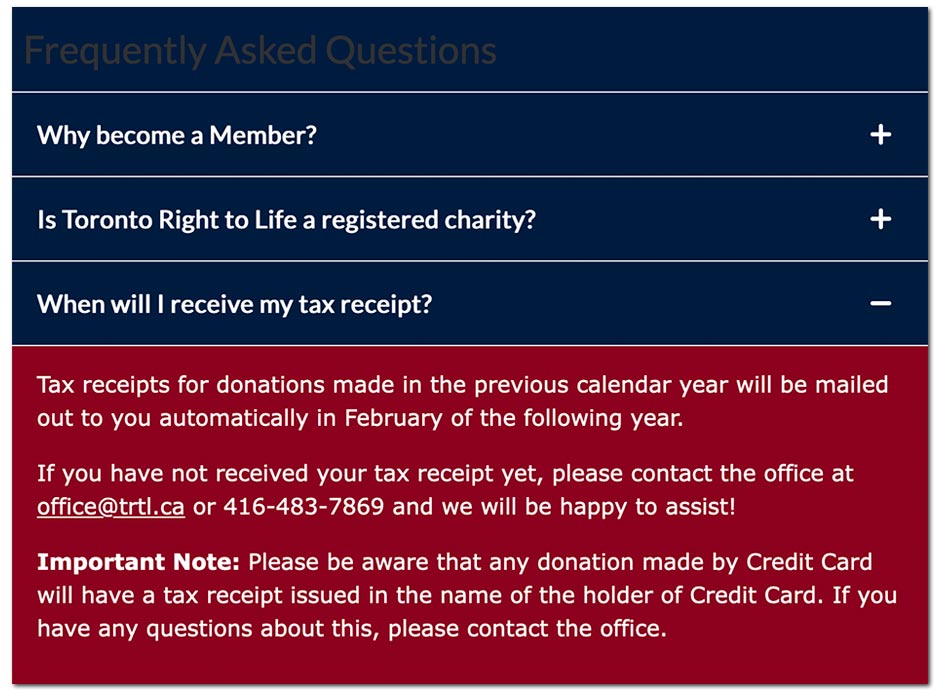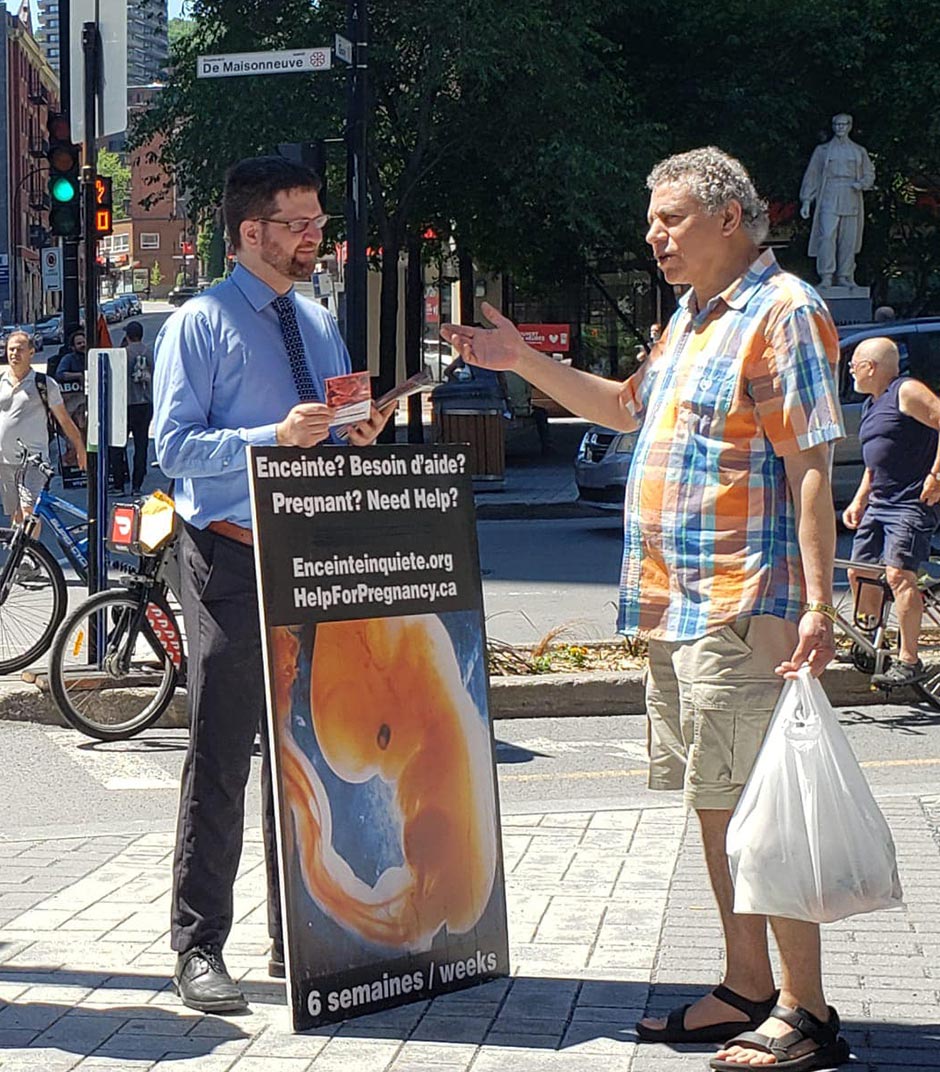
Montréal Anti-Abortion Activists Are Receiving Funding From an Ontario-Based Charity, Despite CRA Rules
Group that left graphic images in mailboxes around Plateau-Mont-Royal neighbourhood received help from ‘Toronto Right to Life’
This article was originally published by Pivot, an independent, non-profit francophone news outlet based in Québec — PressProgress and Pivot are working together to translate and republish each other’s stories.
A Montréal-based anti-abortion group received grant money from a registered charity based in Ontario, something which appears to contradict rules set out by the Canada Revenue Agency.
Montréal Against Abortion and Toronto Right to Life are both part of a network of anti-abortion groups tied to the Canadian Centre for Bio-Ethical Reform, an organization that uses “human rights” rhetoric and graphic imagery to advocate limiting the reproductive rights of women.
Montréal Against Abortion held a “pro-life day of action” on June 24. It was organized jointly with the Canadian Centre for Bio-Ethical Reform to help prepare participants to “change hearts and minds on abortion,” according to the CCBR’s website.
Michelle Caluag and Katie Somers, two staff members at the Right to Life Association of Toronto and Area, which is also called “Toronto Right to Life,” gave the training. Another person involved was Jonathon Van Maren, the communications director for the CCBR. Both TRTL and the CCBR have close ties.
On the afternoon of June 24, participants were invited to participate in a “choice chain” in downtown Montréal. This term designates an activity in which activists stand on busy street corners holding large signs showing pictures of fetal debris. The same day, residents from the Plateau-Mont-Royal neighbourhood found brochures in their mailbox with similar pictures produced by the CCBR.

Montréal Against Abortion (Facebook)
Grant appears to violate rules
Montréal Against Abortion has been in existence for a little over a year, claiming to hold public events once a month.
Merichel Diaz, the group’s founder, is heard in a video posted on social media in November 2021 stating that “Toronto right to life provided a grant that helped us to purchase pro-life signs. We also purchased pamphlets in both languages.” The anti-abortion activist also says that TRTL provided the group with training and was “in constant communication with us to build up the team.”
TRTL’s social media posts corroborate this claim. In December 2021, the organization posted a tweet stating: “Hear from one of the leaders of Montréal Against Abortion about the impact we have on them! Your donation helps other pro-life groups reach their community.” This message was posted with Merichel Diaz’s video.
But, given TRTL is a registered charity, if indeed it gave a grant to the Montréal organization, this would be against the rules of Canada Revenue Agency.
CRA spokesperson Hannah Wardell told Pivot that the law permits registered charities to use their resources in two ways: To carry out their own charitable activities or to make donations to qualified donees. Since Montréal Against Abortion is not a registered charitable organization, it is unclear how it would qualify as a donee, as defined by the CRA.
Pivot found no record of MAA in the Québec business registry. The CRA confirmed that, according to their files, “this entity is not presently a registered charitable organization and has never been recorded as such.”
“If a registered charitable organization offers a grant to an organization that is not a qualified donee, they could be subject to observation measures by the Agency, going as far as the revocation of its registration,” added the spokesperson.
Contacted through Facebook, Montréal Against Abortion referred us to Katie Somers of Toronto Right to Life. Somers answered as the spokesperson for MAA. She confirmed that the group “distributed thousands of flyers in all of downtown Montréal” and that they had held “dozens of conversations on the science of human life from fertilization.”
Pivot asked MAA to confirm that they had received a grant from the Toronto-based registered charity. This is the answer we received:
“Montréal Against Abortion buys material and collaborates with other groups like the Canadian Centre for Bio-Ethical Reform to bring photographic proof that abortion is an act of violence that kills an innocent human being to the population of Montréal.”
As of the time of publishing, Toronto Right to Life has not responded to our questions.

Toronto Right to Life (Facebook)
Publicly subsidized anti-abortion activism
Through tax credits to donors and wage subsidies, anti-abortion groups receive public funding, a fact that pro-choice groups have long decried.
In 2017, the CCBR was embroiled in a judicial battle over the federal Canada Summer Jobs program. The Abortion Rights Coalition of Canada raised questions about anti-abortion groups that received close to $1.8 million from this program between 2010 and 2017. The Trudeau government changed the eligibility conditions and made it mandatory for recipients to sign a declaration stating that they respected charter and reproductive rights. Although anti-abortion groups contested the decision, the requirement still stands.
TRTL claims it received $31,285 from the federal government in the fiscal year ending on March 21, 2021. Verification of the federal government’s website shows that both TRTL and the CCBR received money through the Canada Emergency Wage Subsidy that offered businesses COVID-19 related relief.
TRTL issued receipts for donations totalling $68,834 in the fiscal year ending in March 2021. These receipts allow donors to benefit from tax credits.

FAQ (Toronto Right to Life)
For Joyce Arthur, the executive director of the ARCC, government funding should be limited to organizations and businesses who agree to respect the Charter of rights and freedoms. “That’s the minimum,” she said, “it shouldn’t be complicated.”
TRTL also receives money through Toronto’s cGaming program. This program lets charitable organizations profit from the proceeds of cGaming centres, which host traditional bingo and technology-based gaming machines. The province defines the program, but cities manage it.
City of Toronto spokesperson Mike Hajmasy confirms TRTL has received $80,000 in revenue from cGaming between 2017 and 2021. TRTL’s eligibility was established because it is a registered charity and because its constituting documents stated the organization’s focus was on public education and outreach.
Alex Burke, another spokesperson for the City of Toronto, contacted Pivot to explain that city council has no authority in delivering these permits. City staff apply the requirements set out by the province. He writes, “(TRTL) consider themselves a religious organization that is eligible for a cGaming permit under provincial rules.”
According to the cGaming eligibility requirements, an organization with an educational mandate must “provide a public benefit through instruction.” Groups trying to bring about change to a law or a government policy are not eligible for this program. Also, the document states that “an organization that attempts to influence public opinion […] is not advancing religion in the charitable sense.”
TRTL receives part of their funding through the Catholic charitable organization ShareLife. This financial support is possible because TRTL is a registered charity.

Montréal Against Abortion (Facebook)
Anti-abortion activism as a “career”
The Canadian Centre for Bio-Ethical Reform was founded in 2001. It has a little over 20 staff members, according to the information available on its website. Besides these, there are also interns participating in various programs.
In a blog post, CCBR co-founder Stephanie Gray writes that the inspiration to “consider full-time pro-life work as a career” came from her mentor, Scott Klusendorf. He is the founder of the Life Training Institute, an organization dedicated to training anti-abortion activists. Gray explains that he convinced her by saying “there are more people working full-time to kill babies than there are working full-time to save them.”
After attending a seminar on fundraising strategies for full-time anti-abortion work, Gray founded the CCBR with others.
CCBR staff have to fundraise their salary. In an article published in 2019, Samuel Sey, a Christian blogger, announced he was joining CCBR and claims that he needs to fundraise for the entirety of his salary. He wrote that he needed $2,225 monthly to “support what I want to do for babies in Canada.”
Interns, mostly young people who participate in programs of variable length, need to find about half their salary themselves. According to the CCBR website, for a summer internship taking place from May to August, the participant will receive a salary of $8,000. This individual is responsible for fundraising $4,000 before the start of the internship.
The CCBR did not answer our question asking if all staff members were responsible for raising, all or part, of their salaries.

Montréal Against Abortion (Facebook)
A sensationalist “bioethics”
The CCBR defines itself as a “human rights” and educational organization. It describes the humans whose rights it claims to protect as “pre-born humans.” A form, which TRTL volunteers must sign, states that abortion in all its forms “kills a pre-born human being. It is therefore wrong, regardless of the circumstances under which the child came into existence or the circumstances in which that child continues to develop.”
Besides abortion, the CCBR rejects most hormonal means of contraception, like the contraceptive pill, because they use “methods that cause abortions,” according to a blog post published on their website. CCBR also opposes medical assistance in dying.
The CCBR holds “choice chains” and door-to-door canvassing and leafleting. They drive around various cities with “truth trucks” and hold “abortion awareness projects,” which are exhibits with posters and pictures on university campuses. They also give talks in private and public high schools.
“These are sensationalist tactics,” explains Dr. Carol Williams, professor at the Women and Gender Studies Department of the University of Lethbridge, in Alberta. “At our university, they will set up where all the buses arrive, where a lot of people are coming through.” This is a way to garner attention, explains this professor who teaches a class on the history of reproductive rights. The tactics bear fruit, as she sees that this sensationalism gives the CCBR media coverage.
“Here in southern Alberta, they target post-secondary and high school students,” explains Dr. Carol Williams, “it’s a movement that targets the youth.” According to her, the shift in the anti-abortion movement now using a discourse focused on an appearance of feminism and human rights is part of this strategy of targeting young people.
This rights-based discourse is not new, as this strategy is already firmly implanted in the United States, explains Carol Williams. “Many legislative proposals in Canada were based on this idea of distinct rights between the person carrying the fetus and the fetus itself.” This separation is portrayed by the images used by the CCBR, that show a fetus floating in space, appearing to be separate from the woman’s body.
The desire to see abortion criminalized is clear in an episode of the Pro-life guys podcast produced by the CCBR. In this episode, broadcast this past June, we see Cameron Côté, western outreach director and Pieter Bos, who was the eastern internship director. They discuss the question, “Should mothers who have abortions go to prison?” The podcasters concede that women who had abortions while they were legal should not be imprisoned.
We learn that the work of groups like the CCBR is to shift the culture so that abortion can be declared illegal. For the pro-life guys, women who get an abortion should face the same consequences as people guilty of murder.
Cities try to limit the distribution of shocking material
In June, residents in the City of Hamilton complained after receiving pamphlets from the CCBR. The fact that small children could find these brochures was especially worrisome for parents. “The CCBR has no respect for people’s desires or sensibilities,” says Joyce Arthur, executive director for the Abortion Rights Coalition of Canada.
Contacted by email, the CCBR stated that “we educate the public to save children’s lives and spare people the trauma of abortion — to call for peace and an end to the killing.”
The independent Canadian Ad Standards have criticized the CCBR in 2009, 2015 and 2017 for misleading claims and content that offend the standards of public decency.
For Joyce Arthur, it is important for cities to make sure they take free speech into account when adopting new rules, so that they will not be overturned in court as was the case for the city of Guelph.
This Ontario City removed anti-abortion ads from its buses at the beginning of 2020. After Guelph and Area Right to Life brought this to court, in January 2022, the court declared the city’s decision to have been unreasonable. Guelph was forced to review the way it approves or rejects ads and pay $25,000 in judicial fees.
“We communicate with cities where these groups are active to help them,” explains Joyce Arthur. She adds, “the City of Guelph’s decision was overturned because they didn’t go about it the right way.”
The City of London, Ontario recently passed a bylaw regulating the distribution of material containing provocative images. Groups must now distribute these pamphlets in an envelope that states who the sender is and has a warning as to the material inside. Toronto is also adopting a similar bylaw.
The Canadian network surrounding the CCBR
The CCBR is present across the country. They have an outreach team based in Calgary, another in the Toronto area and various “initiatives” in British Columbia and Manitoba.
The CCBR claims that the various “community groups” that participate in their projects are independent and are not affiliated. Among these groups is Montréal Against Abortion. Pivot could confirm that a website for the Montréal group, currently under construction, is hosted on the same server as the website for the CCBR.
The CCBR is not a registered charitable organization. It has close ties with Toronto Right to Life, which is. For example, announcements for trainings display the logos for both organizations.
A member of the board of TRTL, Blaise Alleyne, is also the eastern outreach director for the CCBR. Blaise Alleyne is the founder of Toronto Against Abortion, which is led by staff of TRTL and CCBR, according to Toronto Against Abortion’s website. This website is hosted on the same server as the website for TRTL.
An international network
The CCBR is an affiliate of a similar organization based in the United States, the Center for Bio-Ethical Reform (CBR). Gregg Cunningham, a former member of Ronald Reagan and a member of the Pennsylvania House of Representatives, founded the CBR in 1009.
The founder explains, in a 1999 interview with the Life Legal Defense Foundation, that he created it in response to the realization that the “pro-life” movement was losing the battle. According to him, anti-abortion activists need to work to “change the culture.” In this interview, he says he wants to target churches that do not preach against abortion, schools and “businesses that in some way support the abortion industry.”
This transborder engagement with the anti-abortion movement in the United States is worrisome, according to Professor Carol Williams. She warns that “it increases the risk (to reproductive rights) in Canada.”
The CBR has ties with several countries. A 2016 newsletter titled “Huge victory for CBR-Poland” was published after the country passed a law banning most abortions. According to the newsletter, this law was the result of mobilization efforts by various conservative organizations, including the CBR-affiliated Right to Life Foundation.
In the United Kingdom, the CBR-UK organization held protests in June 2021 in front of a church that was holding a vaccine clinic between services. The reason they were protesting was the claim that fetal stem cells have been used in developing and producing these COVID-19 vaccines.
Jonathon Van Maren is also a contributing editor to The European Conservative, a magazine that seeks to “illuminate the different varieties of conservative, traditionalist, reactionary, and right-wing thought.” During the Conservative Political Action Conference (CPAC) held in Hungary this year, the editor in chief Alvino-Marino Fantini declared jokingly that “the left has been warning about the vast right-wing conspiracy for years. Well, let’s give it to them.”
Our journalism is powered by readers like you.
We’re an award-winning non-profit news organization that covers topics like social and economic inequality, big business and labour, and right-wing extremism.
Help us build so we can bring to light stories that don’t get the attention they deserve from Canada’s big corporate media outlets.
Donate



